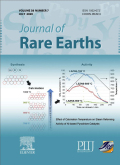- 钛学术文献服务平台 \
- 学术期刊 \
- 工业技术期刊 \
- 冶金工业期刊 \
- 稀土学报(英文版)期刊 \
LaOx(OH)y supported platinum catalysts for CO oxidation:Deactivation by formation of lanthanum carbonate
LaOx(OH)y supported platinum catalysts for CO oxidation:Deactivation by formation of lanthanum carbonate
基本信息来源于合作网站,原文需代理用户跳转至来源网站获取
摘要:
Platinum catalyst for CO oxidation has been studied for decades, due to its high activity and good sta-bility. In this work, we prepared three different lanthanum oxide or hydroxide supports (LaOx(OH)y), and deposited platinum (Pt) with 0.5 at%via an impregnation approach to synthesize Pt/LaOx(OH)y catalysts. However, we find that these catalysts perform a poor stability for the CO oxidation reaction. The fresh and used samples were comprehensively characterized by multiple techniques including power X-ray diffraction (XRD), X-ray absorption fine structure (XAFS), transmission electron microscopy (TEM), temperature-programmed reduction by carbon monoxide (CO-TPR) and thermogravimetric analysis (TGA), to demonstrate that the oxidized platinum atoms or clusters, without any component of Pt-Pt metallic bond, are highly dispersed on the surface of LaOx(OH)y. Furthermore, the as-formed lanthanum carbonate (La2O2CO3) during the exposure to ambient circumstances or in the reaction at-mosphere of CO + O2, severely impair the reactivity of Pt/LaOx(OH)y. On the basis of the obtained experimental results, we have drawn a conclusion that the oxidized PtOx atoms or PtxOy clusters are the active species for CO oxidation, while the formation of lanthanum carbonate is the origin of deactivation on reactivity.

推荐文章
The importance of non-carbonate mineral weathering as a soil formation mechanism within a karst weat
Critical zone
Chemical weathering
Karst
Desertification
Guizhou Province
Sequestration of carbon as carbonate in the critical zone: insights from the Himalayas and Tibetan P
Carbonate
Weathering
Isotope
Tectonic forcing
Basic formation mechanisms of Lake Doroninskoye soda water, East Siberia, Russia
Saline lake
Sulfate reduction
Thermodynamic equilibrium
控制结晶法制备Co(OH)2
硫酸钴
氨水
络合控制结晶法
氢氧化钴
制备
内容分析
关键词云
关键词热度
相关文献总数
(/次)
(/年)
引文网络
引文网络
二级参考文献 (69)
共引文献 (0)
参考文献 (38)
节点文献
引证文献 (0)
同被引文献 (0)
二级引证文献 (0)
1981(1)
- 参考文献(0)
- 二级参考文献(1)
1986(1)
- 参考文献(1)
- 二级参考文献(0)
1993(1)
- 参考文献(0)
- 二级参考文献(1)
1995(2)
- 参考文献(0)
- 二级参考文献(2)
1996(2)
- 参考文献(2)
- 二级参考文献(0)
1997(2)
- 参考文献(0)
- 二级参考文献(2)
1998(1)
- 参考文献(0)
- 二级参考文献(1)
1999(2)
- 参考文献(0)
- 二级参考文献(2)
2001(1)
- 参考文献(0)
- 二级参考文献(1)
2002(3)
- 参考文献(1)
- 二级参考文献(2)
2003(4)
- 参考文献(2)
- 二级参考文献(2)
2004(3)
- 参考文献(0)
- 二级参考文献(3)
2005(4)
- 参考文献(0)
- 二级参考文献(4)
2006(2)
- 参考文献(0)
- 二级参考文献(2)
2007(5)
- 参考文献(1)
- 二级参考文献(4)
2008(2)
- 参考文献(1)
- 二级参考文献(1)
2009(2)
- 参考文献(1)
- 二级参考文献(1)
2010(3)
- 参考文献(1)
- 二级参考文献(2)
2011(7)
- 参考文献(2)
- 二级参考文献(5)
2012(6)
- 参考文献(2)
- 二级参考文献(4)
2013(8)
- 参考文献(1)
- 二级参考文献(7)
2014(6)
- 参考文献(2)
- 二级参考文献(4)
2015(8)
- 参考文献(2)
- 二级参考文献(6)
2016(10)
- 参考文献(2)
- 二级参考文献(8)
2017(8)
- 参考文献(4)
- 二级参考文献(4)
2018(6)
- 参考文献(6)
- 二级参考文献(0)
2019(7)
- 参考文献(7)
- 二级参考文献(0)
2021(0)
- 参考文献(0)
- 二级参考文献(0)
- 引证文献(0)
- 二级引证文献(0)
引文网络交叉学科
相关学者/机构
期刊影响力
稀土学报(英文版)
主办单位:
中国稀土学会
出版周期:
月刊
ISSN:
1002-0721
CN:
11-2788/TF
开本:
大16开
出版地:
北京新街口外大街2号中国稀土学报编辑部
邮发代号:
2-613
创刊时间:
1990
语种:
eng
出版文献量(篇)
4423
总下载数(次)
0
期刊文献
相关文献
推荐文献
- 期刊分类
- 期刊(年)
- 期刊(期)
- 期刊推荐
一般工业技术
交通运输
军事科技
冶金工业
动力工程
化学工业
原子能技术
大学学报
建筑科学
无线电电子学与电信技术
机械与仪表工业
水利工程
环境科学与安全科学
电工技术
石油与天然气工业
矿业工程
自动化技术与计算机技术
航空航天
轻工业与手工业
金属学与金属工艺
稀土学报(英文版)2022
稀土学报(英文版)2021
稀土学报(英文版)2020
稀土学报(英文版)2019
稀土学报(英文版)2018
稀土学报(英文版)2017
稀土学报(英文版)2016
稀土学报(英文版)2015
稀土学报(英文版)2014
稀土学报(英文版)2013
稀土学报(英文版)2012
稀土学报(英文版)2011
稀土学报(英文版)2010
稀土学报(英文版)2009
稀土学报(英文版)2008
稀土学报(英文版)2007
稀土学报(英文版)2006
稀土学报(英文版)2005
稀土学报(英文版)2004
稀土学报(英文版)2003
稀土学报(英文版)2002
稀土学报(英文版)2001
稀土学报(英文版)2000
稀土学报(英文版)2021年第9期
稀土学报(英文版)2021年第8期
稀土学报(英文版)2021年第7期
稀土学报(英文版)2021年第6期
稀土学报(英文版)2021年第5期
稀土学报(英文版)2021年第4期
稀土学报(英文版)2021年第3期
稀土学报(英文版)2021年第2期
稀土学报(英文版)2021年第10期
稀土学报(英文版)2021年第1期

 免费查重
免费查重










